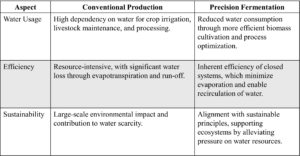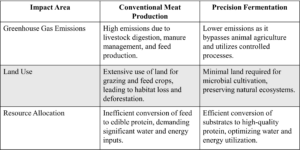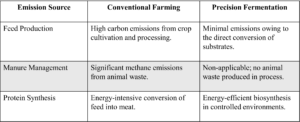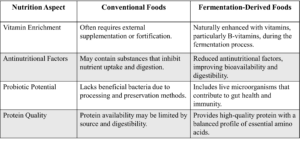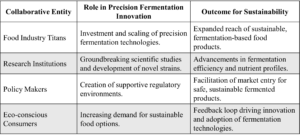Sustainability Outcomes Of Precision Fermentation Processes
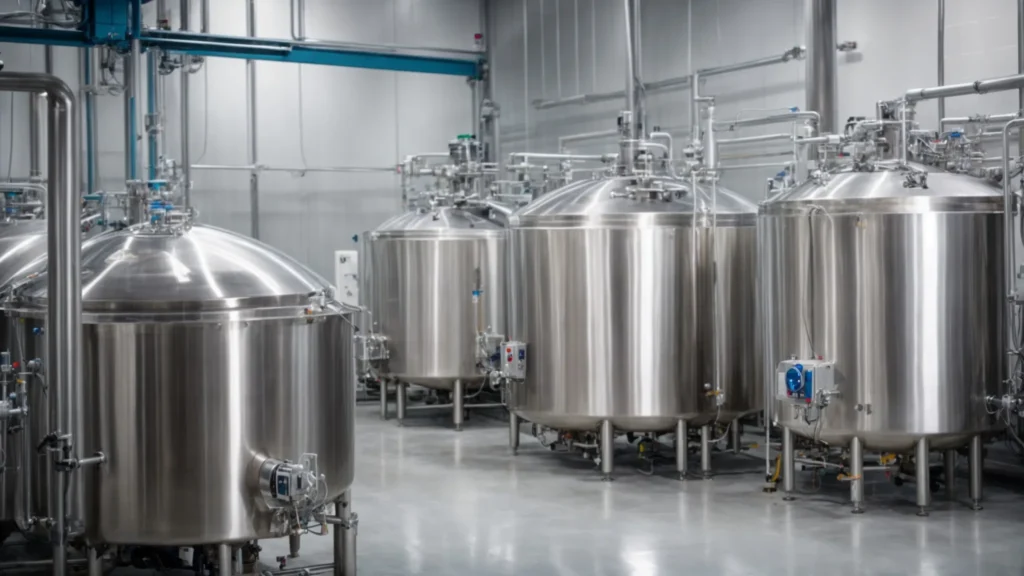
Key Takeaways
-
Precision fermentation significantly reduces the food industry’s carbon footprint and resource use.
-
Adoption of this technology can alleviate water scarcity by optimizing traditional food production methods.
-
Precision fermentation supports biodiversity by reducing the need for monocultural farming and extensive land use.
-
Regulatory compliance and consumer acceptance are critical for widespread adoption.
-
Collaboration between industries, researchers, and policymakers is essential for scalability and sustainability.
Exploring the Environmental Benefits of Precision Fermentation
In the face of our environmental challenges, precision fermentation emerges as a beacon of sustainability, potentially changing the food industry’s relationship with nature. This biotechnological innovation converts sugars into a variety of valuable compounds, from essential proteins for human nutrition to biomass for animal feed. It serves as a robust defense against the escalating greenhouse gas emissions typically linked to industries such as livestock and fossil fuels. By skillfully harnessing the potential of yeasts, bacteria, and fungi, precision fermentation offers concrete solutions for reducing carbon footprints, thereby significantly contributing to environmental sustainability.
Moreover, precision fermentation can redirect vast quantities of freshwater, currently depleted by conventional agriculture and food processing, to areas in dire need. The efficient management of energy consumption, a critical factor in modern industry within bioreactors’ controlled environments, significantly reduces traditional food production’s energy demands. This reassures us of the practical benefits of adopting this cutting-edge method. It can also halt the relentless conversion of forests into agricultural land, preserving these vital ecosystems.
Through this innovative lens, the story of precision fermentation unfolds, promising significant benefits for the planet’s health and a sustainable future for generations to come.
Reducing Greenhouse Gas Emissions Through Innovative Production
In the tapestry of modern industry, precision fermentation positions itself as an artisanal silversmith, elegantly sculpting the landscape of protein production. This innovative process thwarts the surge of greenhouse gas emissions inherent to the meat industry, offering a reprieve to a suffocating atmosphere.
By recalibrating microorganisms’ genetic dials, companies that adopt these biotechnologies initiate a quiet revolution against the carbon-dioxide-spewing titan that is the use of fossil fuels in traditional manufacturing. The resounding echo of fermentation tanks transforming substrates into vital nutrients stands as a testament to a reduced reliance on resources that stain the planet’s complexion with the soot of environmental degradation.
Conservation of Water Resources in Precision Fermentation
The whispers of water scarcity echo globally, yet precision fermentation heralds a shift towards more judicious use of this critical resource. It does so by streamlining traditional methods, where the water footprint of product outputs, such is the case with animal husbandry, is significantly trimmed, enabling conservation on a scale that quenches the thirst of an ever-growing demand for sustainability.
The implementation of precision fermentation in food production manifests as a vanguard effort to combat drought’s grip on the planet. Witness a method where each drop of water is a cherished participant, not a wasted guest: redefining standards in manufacturing and infusing a new ethos of water stewardship into the fibers of the food industry.
Lowering Energy Consumption in the Food Production Sector
The labyrinthine energy demands that once shaped the food production sector are now being untangled through the adoption of precision fermentation. This process, akin to the prudent rearrangement of nature’s own toolkit, enables the industry to bypass the hefty energy expenditures typically associated with the food system—from farm to fork. In an era governed by the imperatives of climate change, this elegant orchestration of biology and technology emerges as a beacon, signaling a reduction in consumption that benefits both the economy and the environment.
Precision fermentation introduces a leaner, more targeted approach by divesting from the energy-intense stages of traditional food manufacturing, where fossil fuels burned like a pyre. It transcends old paradigms by cultivating essential nutritional elements without the trappings of extensive land use or the transportation of bulk goods, effectively diminishing the overall energy footprint. Consequently, the glow of fossil fuel dependency dims, supplanted by a method illuminated by the wisdom of foresight and the commitment to a more balanced planetary metabolism.
Minimizing Land Use and Preventing Deforestation
The relentless march of deforestation, fuelled by the voracious needs of agriculture, finds a challenger in precision fermentation. By rewriting the narrative of land use, this technology offers a reprieve for forests standing on the brink of eradication: a boon for biodiversity preservation and a stroke of strategy against the climate crisis.
Through the lens of precision fermentation, the tableau of traditional farming, with its insatiable appetite for acres, fades into a more conservative portrait of land management. It elevates the art of producing food to that of a careful conservationist, ensuring that verdant landscapes remain more than relics in the shadow of human progress.
Precision Fermentation’s Role in Promoting Circular Economy
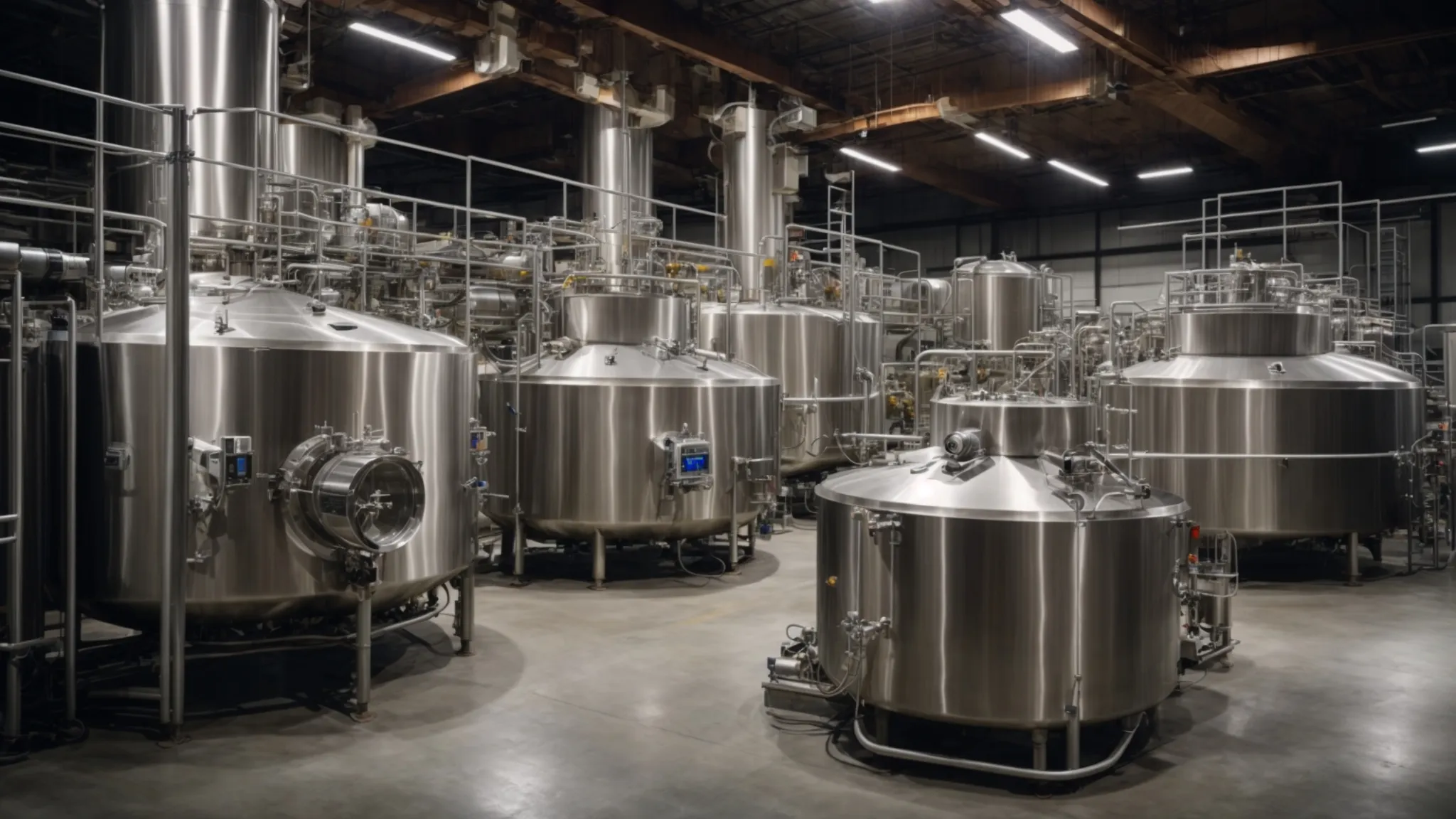
As the global community grapples with the growing imperative of a sustainable future, precision fermentation stands out as a catalyst for a transformative change.
This closed-loop approach is reinventing the way we perceive waste, turning previously discarded raw materials into valuable ingredients.
Through this innovative process, the food industry is witnessing a paradigm shift towards enhanced resource efficiency, proving once again that ingenuity in science can lead to leaps in sustainability.
By adopting such sustainable production practices, ecological footprints shrink, and the impact on biodiversity becomes a celebratory narrative of harmony and balance, opening a new chapter in the chronicle of environmental stewardship.
Transforming Waste Into Valuable Ingredients
In the crucible of innovation, precision fermentation reimagines by-products as the progenitors of novel food ingredients. This transformative process, nestled within the folds of a sustainable economy, engenders the rebirth of sidelined elements—once considered waste—into a cornucopia of nutritional and functional components that embellish the pantry of the food industry.
Pioneering companies are transmuting the chaff of the food system into the wheat of commercial viability, breathing new value into residues through this alchemy of conversion. It’s a reinvention of resourcefulness that strikes at the heart of environmental technology, deploying the science of microorganisms to recast waste not as an endpoint, but as the beginning of a new cycle of abundance and utility.
Enhancing Resource Efficiency in the Food Industry
As the architects behind precision fermentation forge ahead, the food industry marvels at newfound efficiencies. Intertwining this elegant symbiosis of microorganisms and manufacturing processes allows the production of staples like cheese and yogurt to skip the labyrinthine journey of traditional methods, conserving energy and reducing the overall strain on natural resources.
In an orchestrated ballet of biological and engineering prowess, companies adeptly exploit precision fermentation to streamline food processing. This dance, characterized by economic gestures that convert substrates directly into nutrients, taps into previously unimagined levels of resource savings, laying the groundwork for a food system that harmonizes with the ethos of a circular economy.
Supporting Biodiversity With Sustainable Production Practices
The intricate dance of life that constitutes Earth’s biodiversity finds a fortuitous champion in precision fermentation. By sidestepping the need for expansive crop cultivation and grazing lands, this technology nurtures the delicate weave of ecosystems, allowing flora and fauna alike to flourish in their natural habitats, undisturbed by the plow and the pasture.
Through its symbiosis with a circular economy, precision fermentation brandishes the tools to preserve genetic diversity. Its techniques foster an environment where monocultures give way to polycultures, and agrobiodiverse landscapes are cultivated, supporting a rich tapestry of species that sustain the resilience of our planet’s ecological networks.
How Precision Fermentation Contributes to Sustainable Food Systems
In an age where sustainability is not just a catchphrase but an imperative, precision fermentation stands at the forefront of an ecological revolution in the food sector.
This cutting-edge process not only forges the foundation for environmentally friendly alternative proteins, but also significantly reduces reliance on traditional agriculture—a sector known for its heavy ecological toll.
By integrating this innovative technology, stakeholders are addressing critical food security challenges, offering a beacon of hope that technology can indeed reconcile the demands of a burgeoning population with the finite resources of our planet.
The ensuing topics delve into how precision; through strategic application and mindful adoption, precision fermentation is a linchpin to achieving a more resilient and sustainable food system in harmony with Earth’s natural cadence.
Paving the Way for Sustainable Alternative Proteins
Precision fermentation is forging new frontiers in the quest for sustainable alternative proteins, providing a viable solution to the unsustainable pressures exerted by the conventional meat industry. By harnessing microorganisms to convert simple sugars into high-quality proteins, this technology sidesteps the extensive environmental impacts associated with livestock rearing, such as greenhouse gas emissions and deforestation.
The method not only alleviates the strain on the planet’s resources but also ushers in a new era of food diversity that has the potential to enrich global nutrition profiles. Through the production of alternative proteins, precision fermentation ensures a more equitable distribution of nutrients, catering to the world’s dietary needs without compromising environmental integrity:
- Reduces reliance on resource-intensive animal agriculture.
- Diminishes greenhouse gas emissions by bypassing meat production.
- Facilitates equitable access to high-quality proteins.
- Presents opportunities for innovation in the burgeoning meat alternative market.
Decreasing the Reliance on Conventional Agriculture
Precision fermentation, a beacon of innovation in food science, opens up a new chapter in agricultural practice. By enabling the bio-manufacture of proteins and other key nutritional compounds, this advanced technology shifts the tide of dependency away from traditional farming methods. As a result, it paves the way for a reduction in the sprawling expanses of cropland and pasture historically dominated by the production of animal and plant-based food sources.
The ripple effects of this shift are profound, signaling a sea change in how societies approach and manage agricultural domains. Precision fermentation’s strategic role in minimizing the need for land-intensive food production sparks the potential for a future where agriculture’s carbon and water footprints are significantly lightened. This transformative approach marks a critical step forward in redefining global food security within the constraints of ecological boundaries.
Addressing Food Security Through Technology
The realm of precision fermentation stands not only as an emblem of innovation but as a harbinger of hope for food security. The technology is poised to counteract the vulnerabilities of conventional agricultural methods which often face the brunt of climate-induced disparities, ensuring a consistent supply of vital nutrients to populations worldwide.
Seizing the helm of a digitized agricultural evolution, precision fermentation utilizes the prowess of data analytics and genetic engineering, catalyzing a transition toward resilient food systems. It manifests a new epoch where the implementation of technology aligns with the rhythm of human needs and the planet’s capacity, mitigating the specter of scarcity that looms over the diverse spectra of global societies.
Comparing the Carbon Footprint: Precision Fermentation vs. Traditional Farming
In a world meticulously attuned to the intricacies of its own survival, the carbon footprint of different food production methodologies has come under intense scrutiny.
The juxtaposition of precision fermentation against the tableau of traditional farming offers a stark contrast in their environmental impact.
With the planetary balance sheet at the fore, this section dissects the ecological ramifications of conventional meat production and illuminates the carbon savings potential harbored within fermentation-derived products, setting the stage for an incisive analysis of their roles in the pursuit of environmental sustainability.
Analyzing the Environmental Impact of Conventional Meat Production
The environmental impact of conventional meat production casts a long shadow across the tapestry of global sustainability efforts. Greenhouse gas emissions from livestock, chiefly methane and carbon dioxide, contribute significantly to climate change, carrying a burden far weightier than their molecular mass would suggest.
This industry, voracious in its demand for water and feed, stands at the crossroads of a staggering 77% of agricultural land use while yielding less than a fifth of the world’s supply of calories: a lopsided ledger of resource consumption. Moreover, its contribution to deforestation and biodiversity loss paints a troubling picture for the ecosystem’s future:
To graze or not to graze: the meat industry’s quandary hinges on the balance between feeding a growing population and preserving the health of the planet. Traditional animal farming’s ravenous consumption of feed exacerbates the pressures on land already burdened by the gravity of human activity, demanding an urgent reevaluation of its paradigm in the face of finite resources and a shifting climate:
The Carbon Savings Potential of Fermentation-Derived Products
As the tapestry of global energy consumption evolves, the embracing of precision fermentation heralds substantial carbon savings over its agricultural counterparts. This technology, a champion of climate conscientiousness, ushers in an era where the production of dietary staples, particularly proteins, requires a mere fraction of the carbon budget allocated to conventional farming practices.
In the vanguard of sustainable innovation, precision fermentation gives rise to products that shoulder a significantly lighter carbon burden. Articulating a greener narrative of food production, fermentation allows for the synthesis of necessary proteins without the carbon-heavy detritus of the meat industry, painting the horizon with the brushstrokes of environmental potential:
The Future of Sustainable Eating: Insights From Precision Fermentation
The pursuit of sustainability within the food sector has led to a burgeoning interest in the benefits of precision fermentation, spotlighting not only its environmental perks but also the holistic health implications.
As society edges closer to the precipice of nutritional awareness, fermented foods emerge as a cornucopia of health-enhancing elements, offering fortified alternatives to conventional dietary options.
Simultaneously, the success of these innovative food technologies also hinges on the perceptual gateways of consumers, whose acceptance signifies a pivotal juncture in the wider adoption of fermentation-derived fare.
Together, these two threads weave an intricate narrative on the role of precision fermentation in sculpting the future of a sustainable, health-conscious food landscape.
Nutritional Advantages of Fermentation-Derived Foods
Nutritionally, fermentation-derived foods are often imbued with an array of beneficial compounds, elevating their status within the pantheon of healthful eating. Through the chiseling touch of precision fermentation, foods become enriched with vitamins, essential amino acids, and bioactive peptides, providing a distinguished profile that is usually more digestible and thus potentially more nourishing than their non-fermented counterparts.
The artful application of precision fermentation transcends simple nutrient enhancement; it also wields the power to diminish antinutritional factors, a boon for human nutrition. This process, akin to a sculptor refining a raw block into a masterpiece, carefully diminishes components that might interfere with mineral absorption or digestive comfort, ensuring that each bite is not only nutrient-dense but also friendly to the body’s inner workings:
Consumer Perception and Acceptance of Fermented Food Products
The convivial banquet of fermented food products is plied with generous servings of health benefits, yet the table can only be set once consumers’ apprehensions and tastes are addressed. Establishing a bridge between the old-world charm of traditional fermentation and the innovative strides of precision techniques presents a unique challenge, as public acceptance is often entwined with cultural and dietary familiarity.
Amid the cacophony of ever-expanding food choices, the distinct tang of fermentation-derived products competes for a distinguished space on the palate of the global consumer. Marketing and educational efforts are pivotal in shifting perceptions, as food companies and science-driven entities weave the story of these products’ environmental stewardship into a compelling narrative that resonates with contemporary concerns and indulges the senses.
Challenges and Opportunities in Scaling Precision Fermentation
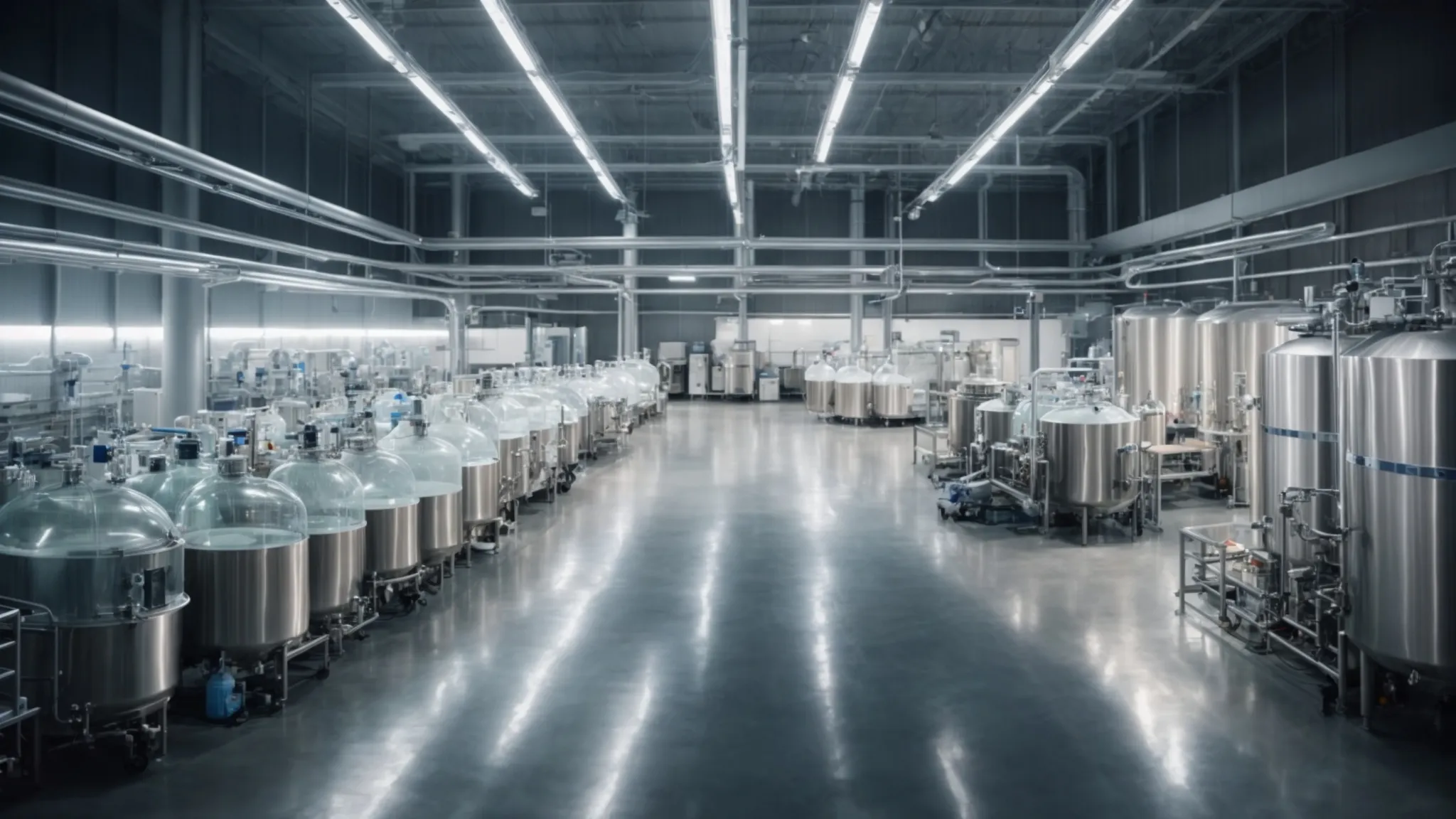
The voyage of precision fermentation towards full-scale adoption navigates a complex matrix of challenges and opportunities.
As this canopy of innovation expands over the food industry, it encounters the gusting headwinds of technical intricacies and the unpredictable currents of economic viability.
A mosaic of regulatory frameworks further textures the landscape, each tile reflecting the nuanced considerations of safety, nutrition, and environmental impact that these novel products precipitate.
Yet, it is not a journey made in isolation; a symphony of collaborations crystallizes around the core of precision fermentation, promising an epoch of innovations that drive the future of sustainable food systems.
This intricate web of synergies and strategies forms the bedrock upon which the scalability of precision fermentation rests, opening prospects for a radical transformation of the food sector.
Overcoming Technical and Economic Barriers
Innovation in precision fermentation scales like the evolution of ecosystems: seamlessly but not without its challenges. The intricacies of genetic engineering and bioreactor design present technical hurdles, while wariness from investors about untested markets introduces economic friction.
However, it is the tandem of scientific breakthroughs and judicious financial planning that ignites the expansion of this nascent field: precision in process and precision in finance, harmonizing to craft a sustainable path forward.
- Addressing the complexity of microbial ecosystems used in precision fermentation
- Designing bioreactors for optimal efficiency and scalability
- Navigating market acceptance and demand for fermentation-derived products
- Securing investment to fuel research and development
- Streamlining regulatory pathways for novel foods across different regions
- Fostering collaborations between scientists, engineers, and the financial sector
- Communicating the environmental and nutritional benefits to consumers
- Implementing robust management systems to ensure product consistency and quality
The Regulatory Landscape for Fermentation-Based Food Products
As precision fermentation ventures into the heart of the food industry, it wades through the regulatory marshlands that seek to preserve public health and consumer safety. Navigating this complex terrain requires adherence to a global patchwork of food safety standards, where the Food and Drug Administration (FDA) and the European Union (EU) set the pace with rigorous scrutiny and clear directives.
The policy framework developing around the bounty of fermentation-based products heightens the mandate for transparency and scientific validation. Complying with regulations that often categorize such novelties under ‘Generally Recognized as Safe’ (GRAS) status or as ‘novel foods,’ companies must meticulously prove the safety and benefits of their innovative offerings:
- Documenting the microbial strains employed for precision fermentation to ensure they are non-pathogenic and safe for consumption.
- Substantiating any health claims made regarding fermentation-based products with concrete scientific evidence.
- Ensuring that end products meet all nutritional guidelines and standards set forth by relevant authorities.
Collaborations and Innovations Driving the Future of Fermentation
The tapestry of precision fermentation is enriched by a blend of collaborations that weave together diverse industries and disciplines. Entities ranging from pioneering startups to established food companies unite with scientific research labs and policy makers, crafting an interconnected network that propels innovations from the incubator to the marketplace.
In this orchestra of innovation, technological advancements echo as the fundamental melody, where the integration of artificial intelligence and advanced bioprocessing tools fine-tunes the precision fermentation processes. Emerging technologies accelerate research in microbial metabolism and biotechnology and facilitate the meticulous design of bioreactors, ensuring scalability that aligns with the crescendo of sustainable food demands.
Partner with LEC for Precision Fermentation Success
At LEC Partners, we are dedicated to helping businesses of all sizes achieve sustainable and successful outcomes. Whether you’re a startup or a multinational company, our community of world-renowned bioeconomy experts has the experience and expertise to guide you to success.
Why Choose LEC Partners?
- Unmatched Bioeconomy Expertise: As trusted leaders in the bioeconomy, we deliver sustainable and profitable results, guiding projects from planning to execution.
- Customized Teams: Your project is unique, and so is our approach. We assemble a custom team to meet your specific needs, whether you require one expert or many.
- Streamlined Communication: No matter the size of your project team, you will always have a single point of contact for seamless coordination and communication.
- Comprehensive Services: Beyond engineering, operational, and financial guidance, we offer additional services like regulatory support and expert witness testimony, to ensure you are covered from every angle.
Ready to Transform Your Precision Fermentation Business?
Take the next step and partner with us to shape the future of Precision Fermentation. Contact us today to learn how our community of over 180 bioeconomy experts can help you achieve your goals.
Have some questions?
Not sure where to start?
Let's start a conversation. We're here to help you navigate
the bioeconomy with confidence.
